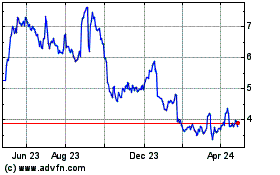By A Wall Street Journal Roundup
In the past few weeks, investors have bid up the share prices of
companies such as GameStop Corp. and AMC Entertainment Holdings
Inc., as short sellers have bet against them. Here is an analysis
of the challenges and prospects for these businesses.
GameStop
GameStop is trying to survive a yearslong erosion of its
business, which has relied for nearly four decades on people
visiting its bricks-and-mortar stores to buy the latest videogames
and consoles, as well as to trade-in and purchase used games and
gear.
The company has been stung by mounting competition from retail
giants such as Amazon.com Inc. and Walmart Inc., and the
advancement of technology that enables people to download games
directly from consoles and computers instead of buying hard copies.
It has also gone through a period of high executive turnover with
Chief Executive George Sherman, a longtime retail executive who
joined GameStop in 2019, being the fifth person to hold the role
since November 2017.
To preserve its business, Grapevine, Texas,-based GameStop has
been working to pay down debt and pledged to accelerate its
e-commerce operations. In the recent holiday season, the company's
e-commerce sales rose more than 300% from the comparable
year-earlier period, helped by the release of new videogame
consoles from Microsoft Corp. and Sony Corp.
One of GameStop's newest board members, Chewy Inc. co-founder
Ryan Cohen, urged the company last year to exit underperforming
stores in the U.S. He also called for the company to close
nonessential operations in Europe and Australia and use the
proceeds to make tech improvements, such as revamping GameStop's
online store.
Analysts expect GameStop to post its fourth consecutive annual
decline in revenue in its latest fiscal year amid declines in its
core operations and efforts to streamline its business.
-- Sarah E. Needleman
AMC Entertainment Holdings
AMC, the world's largest cinema chain with nearly 1,000
locations, became the latest darling of the retail trading scene
after it signed a series of financing deals that are expected to
help it ward off bankruptcy.
Since the onset of the coronavirus pandemic forced AMC to
temporarily close most of its theaters, the Leawood, Kan.-based
company has faced the real possibility running out of cash, and
warned investors in October that it may need to file for chapter 11
if it doesn't raise enough money from investors willing to bet on
its recovery.
AMC's fortunes began to turn with the introduction of
coronavirus vaccines late last year, which raised hopes among
investors that it won't be too long before people start going out
to the movies again.
The company has raised about $1.3 billion of debt and equity
financing since December, selling out its latest shelf offering on
Jan. 27 right after users in Reddit's WallStreetBets forum turned
their attention to it as the next stock to prop up.
However, AMC isn't totally out of the woods yet, and Chief
Executive Adam Aron warned on Jan. 25 that while "any talk of an
imminent bankruptcy is completely off the table," investors in AMC
are still advised to exercise caution as the company's future cash
needs are uncertain in light of the continuing pandemic and new
strains of the coronavirus.
-- Alexander Gladstone
Bed Bath & Beyond Inc.
After an activist investor ousted prior management in 2019, the
home-goods retailer is trying to fashion a turnaround under new CEO
Mark Tritton, a former Target Corp. executive. Mr. Tritton has
hired a new leadership team that is decluttering stores,
simplifying prices and streamlining merchandise. "The wider the
assortment, the more confused the customer is," Mr. Tritton said in
November.
The company is closing about 200 of its more than 970 Bed Bath
& Beyond stores and has sold assets deemed noncore such as
Christmas Tree Shops. It has also launched a share repurchase
program totaling as much as $825 million over three years.
The company, which also owns BuyBuy Baby, is benefiting from a
shift in pandemic-driven spending toward items for the home. But
some analysts worry that once life returns to normal, it will give
up some gains as shoppers spend more on travel and eating out. The
retailer also faces heavy competition from mass market chains like
Target and online rivals such as Amazon. On Jan. 26, before the
stock gave up some of its recent gains, UBS downgraded it to sell
over concerns that its turnaround would proceed in fits and starts
and other issues.
-- Suzanne Kapner
Nokia Corp.
Nokia in its heyday dominated the market for hardy handsets
built for making phone calls and not much else. Then the smartphone
revolution robbed the Finnish company of the market share it once
enjoyed, leading the company to abandon cellphones and focus on the
building blocks of the mobile economy: network equipment that links
mobile devices to the rest of the internet.
Nokia's profitability has suffered since its 2016 purchase of
Alcatel-Lucent, another maker of network electronics. The merger
made the new company more complex and forced expensive upgrades for
clients that sought standardized cellular equipment. Rivals
Ericsson AB and Huawei Technologies Co. have used the opportunity
to gain market share in key countries.
The company still supplies much of the world's network gear, a
market poised for growth this year as carriers install new
technology to support faster fifth-generation, or 5G, wireless
service. The company last year shook up its management team by
naming a new chief executive and finance chief.
Nokia is preparing to sell more machines to replace cell-tower
equipment from China-based Huawei, which the U.S. and many allied
countries have effectively banned due to national-security
concerns. But geopolitics cut both ways, and increasing tensions
with the West could dent Nokia's own sales in China.
-- Drew FitzGerald
BlackBerry Ltd.
BlackBerry CEO John Chen successfully rescued the Canadian
company from near collapse after he was hired in 2013 to reinvent a
smartphone maker that had ceded its global market dominance to more
nimble competitors such as Apple Inc. and Samsung Electronics Co.
He shrank the company's staff and global operations and licensed
other manufacturers to make BlackBerry phones.
Mr. Chen, a software veteran, sought to reinvent BlackBerry by
selling software and services designed to shield business and
government communication systems and mobile devices from viruses
and other online threats.
He sought to expand this business in 2018 with a $1.4 billion
purchase of Cylance Inc., a maker of antivirus software. The
acquisition hasn't delivered the promised turnaround. Cylance's
co-founder Stuart McClure departed in 2019 and BlackBerry revenues
continue to shrink. The company has reported net losses for the
last seven quarters.
Another setback is uneven demand for automobiles during the
Covid-19 pandemic. BlackBerry sells security products to auto
makers to protect computer and communication systems in cars from
cyber threats.
-- Jacquie McNish
(END) Dow Jones Newswires
January 31, 2021 16:51 ET (21:51 GMT)
Copyright (c) 2021 Dow Jones & Company, Inc.
BlackBerry (TSX:BB)
Historical Stock Chart
From Mar 2024 to Apr 2024

BlackBerry (TSX:BB)
Historical Stock Chart
From Apr 2023 to Apr 2024
